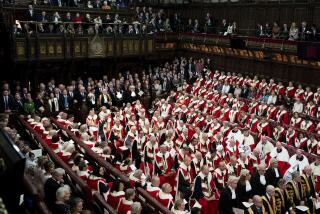British Lord Chancellor Sheds an Unfashionable Tradition
- Share via
LONDON — Once again, centuries of tradition faced off against the forces for change in Britain this week. The winner was the lord chancellor, who was granted permission to abandon--except on special occasions--his 17th century costume of a shoulder-length wig, lace-sleeved coat, black tights and buckled shoes.
Lord Irvine of Lairg, the lord chancellor, had complained that the wig “weighs a ton.” He appealed to the House of Lords, asking that he be allowed to wear 20th century trousers and well-polished black shoes for his everyday work presiding over Britain’s upper chamber of Parliament.
“For male adults of sound mind,” he said, “the days of breeches and tights and buckled shoes should really go.”
He also asked to step down from the lord chancellor’s woolsack--a cushioned seat stuffed with British and Commonwealth wool, a product that once represented the country’s chief source of wealth--to spend more time on the front benches with his fellow members of government.
Although the peers voted 145 to 115 in favor, the changes were not made lightly. Some peers were quick to point out that Lord Irvine recently spent $1 million of taxpayers’ money to restore his Palace of Westminster apartment to its traditional, early Victorian state.
“It would seem curious for one who is so punctilious that his apartment should correctly reflect history, that the same critical analysis should not apply to the lord chancellor’s dress,” said the 13th Earl Ferrers.
As the leader of those opposed to dressing down, Ferrers said this was but another example of the Labor government “chipping away at the traditions and standards which have been so much a part of this country and are so admired by other countries that don’t have them.”
Another example is the government’s intention to do away with the speaking and voting rights of the 633 hereditary peers of the realm, who hold seats in the 1,164-member House of Lords purely because of their aristocratic roots. Other members are chosen by the queen at the recommendation of the prime minister.
The government is expected to announce this legislation at the state opening of Parliament next week in a speech to be read, according to tradition, by Queen Elizabeth II. The pageantry will be pared down here too, with just a few dozen escorts accompanying the queen into the House of Lords. About 14 of her ushers and bodyguards have been dropped from the traditional procession--a populist gesture on the part of a queen who has agreed to pay taxes. Lord Irvine will wear his traditional garb to the opening of Parliament, for which his colleagues dress in ermine-trimmed robes. The agreement on the lord chancellor’s attire was approved after two hours of debate.
Lord Strabolgi, a Labor Party peer and deputy speaker of the House of Lords, supported the change during the debate. saying that “surely we have to move with the times in this more informal age.” Baroness Young, the former Tory leader of the House of Lords, countered that “a lot of professions have not helped their public standing by dressing down” and wondered where it would all end. The Times of London noted that “women are used to wearing tights all day but men, in these matters, are the weaker sex. The lord chancellor should certainly be saved the embarrassment of having to bulk-buy large black opaques at his local Boots [store].”
More to Read
Sign up for Essential California
The most important California stories and recommendations in your inbox every morning.
You may occasionally receive promotional content from the Los Angeles Times.











